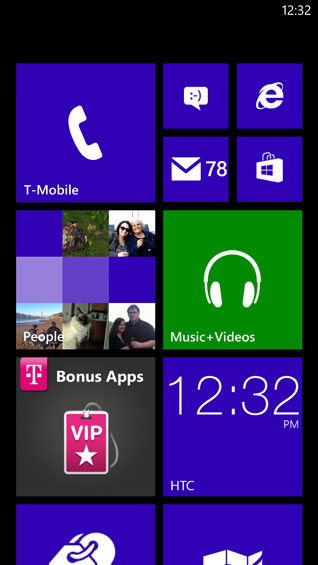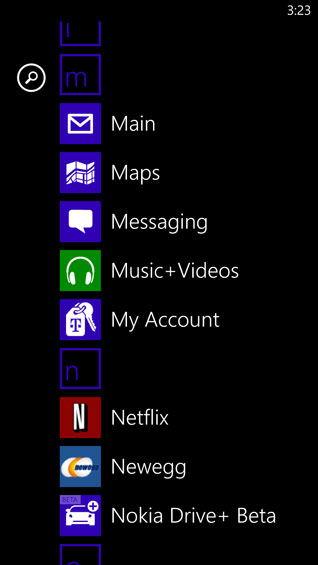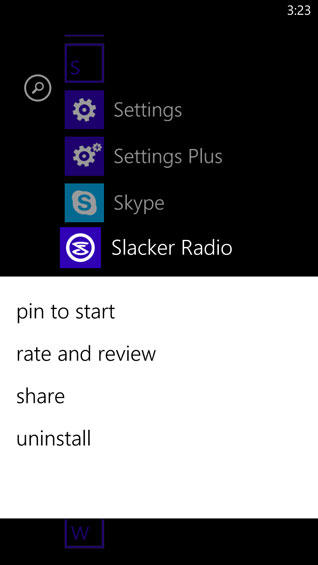From Mango to Apollo: The HTC Windows Phone 8X on the Daily
by Dustin Sklavos on January 28, 2013 12:01 AM EST- Posted in
- Laptops
- windows phone 8
- Windows Phone 8X
- HTC 8X
The Windows Phone Interface
When Microsoft came up with the Metro Modern UI design language, their goal was essentially to streamline and simplify the interface as much as humanly possible. For me at least, this was a huge draw towards the platform (though I benefitted from arriving to the smartphone race late.) The Modern UI was designed to run in portrait mode, and it takes tremendous advantage of the increased vertical space.

If you're unfamiliar with it, Windows Phone 8's interface involves two basic screens: the start page which features live tiles, and an application list. For WP8, Microsoft has gone from having two live tile sizes to three, and while I feel like it clutters the interface, it's ultimately much more productive. The tiles both launch applications and, depending on which applications they link to, can also provide useful information, essentially combining desktop widgets with shortcuts into a single useful "button." The tiles also tend to blend together in a much neater and more orderly fashion than widgets and icons do in iOS or Android, and they're very easy to rearrange and resize. Microsoft won't let you personalize your background (only your lock screen), but you can get a lot of mileage out of customizing the start page exactly.

Meanwhile, the application list has amusingly been the standout feature of Windows Phone every time I've shown it to anyone: it's just that sensible. If you swipe left from the start menu, the application list is exactly what it sounds like: a vertical list of the apps installed on the phone, alphabetized. Icon on the left, name on the right. Once you reach a critical mass of apps, the letters of the alphabet pop up above each set of apps that start with that letter; you can tap the letter to bring up the alphabet, then tap the first letter of the app you want to find. Or, you can scroll up or down to it. Either way, to me at least, this is a very intuitive way of keeping the phone organized.

Finally, holding your finger on anything you're interested in brings up a menu that allows you to modify it. Uninstalling apps is as easy as choosing "uninstall app." "Pin to Start Menu" does exactly what it says. On the start menu itself, all of the tiles start floating, allowing you to rearrange them. You can resize them by tapping the arrow on the bottom right corner of the tile.
When you do use applications that employ the Modern UI design language, screens remain exceptionally clean. Since you're restricted to customization between having white text on a black background or black text on a white background and can only choose which accent color you want the tiles and highlights to use, the interface remains crisp and easy to understand.
Ultimately, between Windows Phone 7.5 and Windows Phone 8, the only immediately visible major interface change is the addition of the quarter-sized live tile on the start menu. You can add additional notifications to the lock screen and choose a single application to get a full text readout, but I felt like the one notification type seriously missing from the WP7.5 lock screen was a toast notification for whatever games I was playing with friends (i.e. WordFeud). Despite being able to assign a "games" icon to the lock screen, there's still no toast notification for any of the games I play. On the flipside, pinning the games I play regularly to the start menu allows the live tiles to indicate to me whenever it's my turn, so at least there's some way to know.










117 Comments
View All Comments
a5cent - Monday, January 28, 2013 - link
Fact is that most apps simply do not require WP8 hardware. Consequentially, many new apps still target WP7 and can thus also run on WP8. No problem! I don't feel screwed at all. No developer will unnecessarily exclude potential WP7 customers without a good reason for doing so. It's economics.The story is no different from Windows. Almost nobody develops software explicitly for Windows 8 or even Windows 7. Even to this day, most commercial software targets the Windows XP API... in the interest of compatibility and the ability to sell to as many potential customers as possible.
Obviously WP7 won't have a grip on the developer community for a comparable amount of time. The WP market is miniscule compared to XP and the lifespan of the majority of smartphones ends after two years. Developers targeting WP7 will disappear together with WP7's market share, or when it becomes irrelevant compared to newer versions of the OS.
Nobody got screwed. People are just so used to thinking in terms of Android or iOS that they can't remember that other models exist that are just as viable.
dragonsqrrl - Monday, January 28, 2013 - link
"Windows Phone 7 was a rough draft and a product with no real future the moment it left Microsoft, and they knew it."This is the problem, and for anyone who's followed Microsoft's mobile strategy since the days of the Zune, it's painfully obvious what that strategy has been all about. The point is that Microsoft has no plans to support or develop a platform beyond the requirement of having to upgrade to a new platform. The ability to transfer apps has nothing to do with this, it's the lack of apps and lack of support. But again like I said before, the situation with WP7 is far less severe than the Zune HD, the Kin (remember that?... probably not) or many of Microsoft's other short-lived beta tests in the mobile market. But the same basic attributes haven't changed for years.
I just went back to some older articles regarding the longevity of these past devices, to check some of my comments, and I'm amazed, absolutely floored by how applicable they still are to this current situation. Nothings really changed.
http://www.tomsguide.com/us/Kin-Kin-One-Kin-Two-Wi...
Let me just quote a segment from a comment I made in this article:
"another example of Microsoft playing "beta tester" with its customers. I don't know who's in charge of their mobile programs, but they've been killing off support for new products pretty often lately, and this new business model doesn't reflect well on Microsoft... it's pretty shameful of Microsoft to 'use' their customers in this way. So what happens if WP7 doesn't pan out quite as well as they're anticipating? Will they simply kill support for it a few months later in anticipation of something newer and better? Will people then justify it by saying "who would buy such a bad phone to begin with..."? The problem isn't that consumers are buying these products, it's that Microsoft is using them to achieve a powerful, robust, and popular mobile platform, no matter how many short lived non-supported iterations it takes. Supporting 'older' products and having backwards compatibility is such a burden."
http://www.tomsguide.com/us/Zune-HD-Zune-Services-...
"Wow, and so it finally happens... well, unofficially. Microsoft basically killed off the Zune HD five months after its release, so this is no surprise whatsoever... It probably doesn't help that software development for the device was locked from the get go, or that Microsoft basically killed off what little development existed for the device 5 months into its release."
You see, Microsoft has been playing catch-up in this market for years, and I don't think their behavior is going to change until they do catch-up. There's no real future for many of their new devices, no plan to support or develop them after the next iteration hits the market. Each revision of their mobile platform really is nothing more then a brief, unsupported, unadvertised stepping stone to the next thing. And its no accident, that's their strategy to get to where they're going as quickly as possible. The only casualty of this practice are their customers.
krutou - Tuesday, January 29, 2013 - link
Dustin's talking about how WP7.5 was sold as an 'unfinished' and 'unpolished' product. Kind of like the Windows 8's Metro UI for desktop, unfinished and unpolished for non-touchscreen users."If you're a Blizzard fan you're probably used to being treated like a free beta tester, but for the rest of us, the relatively barren app ecosystem, entry level operating system, outdated hardware, and lack of support even from Microsoft undoubtedly felt disappointing."
ATimson - Tuesday, January 29, 2013 - link
We get screwed by not getting the backup features added to WP8. That makes it rather hard to actually migrate to WP8 without losing everything from our WP7.5 phone.ericore - Monday, January 28, 2013 - link
Lmao. Microsoft never learns.The reason that Windows 8, and Windows 8 Phone are both failures
-lack of Freedom and Openness
This is why Microsoft XP was a success because it was Open and Stable.
And this is why XP will continue to occupy much market share.
And this is why some of the more savvy users use Linux.
I.e., Forced metro interface on Windows 8. What right do you have to tell users how to use their computers; none.
I.e., Lack of Flash Player support on Windows Phone 8; because they can't admit or respect Flash Players' success.
The big two for me is the relatively poor app ecosystem and lack of flash player support.
Flash player should be included, and Microsoft should give devs a platform life expectancy, say 4 years, with a tool to port apps to the new OS thereafter. Otherwise, I myself would not want to create a Windows 8 Phone app. They're probably already pissed off at the rapid transition between 7, 7.5 and 8, and Windows Phone 8 low market share etc.
To me the most appealing Phone OS is Ubuntu Phone OS.
JKflipflop98 - Monday, January 28, 2013 - link
Now, did you pull this out of your ass all by yourself, or did you have a friend help you? I mean, I've seen people make up some stupid crap in their blind rage over Win8 - but this by and large takes the prize.BabelHuber - Monday, January 28, 2013 - link
Do you have any arguments, or are you only capable of insulting other people?ericore exactly nailed the problem:
iOS is a wallet garden, but has a huge App selection and is easy to use.
Android is often more complex to use, but provides much more flexibility (e.g. File Browser, multiple Internet Browser engines, sideloading of Apps supported by default, rooting, Custom ROMS, App Launchers (even WP-like ones!) etcetc.).
So where does WP fit in here? What are the advantages of WP?
I have already recommended iPhones to people who are not tech-savy, even though I personally prefer Android for my needs.
But why should I recommend WP to anybody? Because the UI has tiles instead of icons?
Hence WP is too little, too late.
And this is the reason why WP still resides in the low single digits market share-wise more than two years after launch. As simple as that.
JPDVM2014 - Monday, January 28, 2013 - link
WP fits in between. I think it is a good combination of iOS and Android. It is stable(and closed) like iOS, however, it has a more interesting and usable interface like Android. It may not be better than either one in your opinion, but there is always room for choice. I like WP for the exact reason that it has tiles instead of icons. They are way more useful than any iOS app icon. iOS would be perfect, if it had a completely different interface. Android, on the other hand, is too much. I had all that ROM cooking and what not "fun" in my windows mobile days. Now, I just want something that works. WP is it, for me.As a side note, I also recommend non tech-savvy people to the iPhone. I have no illusions about WP. It just is easier than explaining that with WP, there may be times when you don't have the new "hot" app.
maximumGPU - Monday, January 28, 2013 - link
"because they can't admit or respect Flash Players' success."...right.
JPDVM2014 - Monday, January 28, 2013 - link
"Lack of Flash Player support on Windows Phone 8; because they can't admit or respect Flash Players' success."Flash player on mobile is dead...learn your facts before you post a rant. Why would MS support something that isn't even going to be supported by its own company?
And the forced Metro interface is easily fixed by an app that costs a few dollars. Granted, it should be an option within the OS itself, but it is hardly worth all the whining. Even without the app, it takes literally 1 second to switch out of the Metro interface, and there is little to no reason to go back into it until a restart.
I do agree about Ubuntu OS being appealing, if it ever makes it to market.